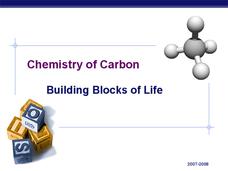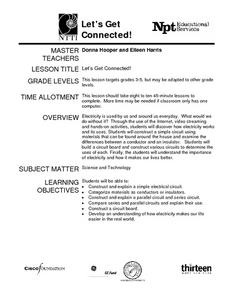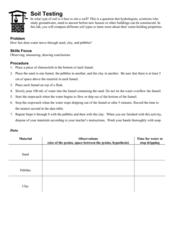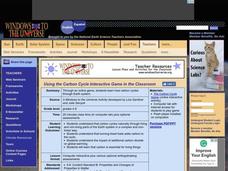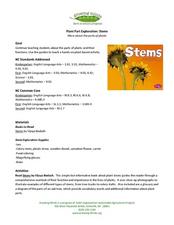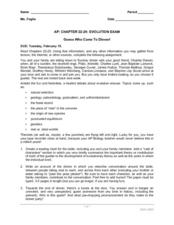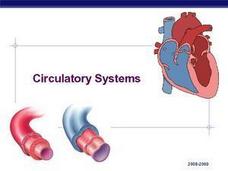Curated OER
Igneous Rocks
High schoolers focus on a study of igneous rocks. They see how igneous rocks are formed, and how to distinguish them from other types of rocks. A crystal-growing activity is present, and learners create drawings that show where each...
Curated OER
Wonderful Wetlands
Fifth graders describe a wetland habitat and its components. They provide, in writing, at least one example of a wetland food chain, relate wetlands to ecological functions, and relate the importance of wetland functions to their own...
Curated OER
Chemistry of Carbon - Building Blocks of Life
A great review of the structure and function of carbon-based molecules important to life, especially with relevance to humans. The chemistry behind the combination of polymers and the breakdown of bonds is covered. Valuable content...
Curated OER
Doin' The Moonwalk
If you are looking for an outstanding lesson on the Moon for your budding astronomers, look no further! This outstanding plan is full of wonderful, meaningful activities for your charges to engage in. Pupils will discover why there are...
Curated OER
Round and Round
Learners interpret data from a three-dimensional array of current monitors to determine an overall pattern of water circulation. They hypothesize what effect an observed water circulation pattern might have on seamount fauna. A very...
Curated OER
The Hydrologic (Water) Cycle
Learners construct a model of the hydrologic cycle, and observe that water is an element of a cycle in the natural environment. They explain how the hydrologic cycle works and why it is important, and compare the hydrologic cycle to...
Curated OER
Let's Get Connected!
A great lesson plan introduces your youngsters to electricity. They use internet links, streaming video, and engage in hands-on activities to understand what electricity is and how it works. They build a circuit board, and construct a...
Curated OER
Answering Carnival Questions with the Scientific Method
Through the use of a Reading Rainbow episode, clever in-class games and activities, and an ITV Series video, second and third graders engage in a study of the scientific method; what it is, and how scientists use it. This well-designed...
Intel
Insects: The Good, The Bad, The Ugly
What would the world be like with no insects? Ponder this question using a research-based STEM unit that encourages scholars to investigate insects from both a beneficial and hazardous perspective. They learn about insect behaviors,...
Safe Drinking Water Foundation
Types of Water Pollution
In groups, young environmentalists investigate water samples that are contaminated with different types of pollutants. Each group presents their findings to the class and fills out the "Types of Pollutants Chart." This lesson is meant...
Captain Planet Foundation
Rotting Away
What happens at the end of a plant's life cycle? Show kids the natural way that plants show that they're decomposing, as well as the importance of compost, with a lesson about living organisms. After reading Log Cabin by Anne Schreiber,...
Curated OER
Simple Machines I - Inclined Planes, Wedges, and Screws
The principles and uses of inclined planes, screws, and wedges are the focus of a science lesson. In it, youngsters come up with every day examples of simple machines, and build an example of one in class. That project is then used to...
Curated OER
Soil Testing
Earth science learners experiment with the water-holding properties of sand, pebbles, and clay. They apply their findings to the building of a well. This activity is engaging and tactile, and it demonstrates the importance of considering...
Curated OER
Archeologists For a Day
Students listen to a reading about fossils and go on a hunt for items with fossil characteristics. In this cross curricular fossil lesson, students will examine their fossil finds and create a graphic organizer. Students...
Curated OER
Using the Carbon Cycle Interactive Game in the Classroom
An online reading and interactive game bring the path of a carbon molecule to life for your earth science explorers! As an assessment, learners can map out or write about their experience in the carbon cycle. Thoroughly written...
Curated OER
Return to the Moon
Students react to statements about space exploration, then read a news article about plans to resume manned flights to the moon. In this space science and current events lesson plan, the teacher introduces the article with a discussion...
Desert Discoveries
Keepers of the Prairie
Young ecologists examine the case of the prairie dog, and their near extinction. They read a terrific student handout embedded in the plan, and engage in a class discussion that's based on what they read. Learners perform research on...
Cornell University
Shedding a "Little" Light on Cancer Surgery
Many types of cancer treatments now depend on nanotechnology—a big "little" discovery. Scholars begin by removing "malignant" tissue from simulated brains, one using fluorescent markers thanks to nanotechnology and one without. This...
Curated OER
Healthy Snacks Project Lesson
After learning why it is important to limit salt, fat, and sugar in their diets, divide your class into pairs or groups to complete this project. Each group will create two charts: unhealthy and healthy foods. They will cut out food...
American Chemical Society
Changing State: Evaporation
Why do experiments require a control? Guide scholars through designing an experiment to see what they can do to evaporate water faster with a lesson that stresses the importance of controlling all variables. The second activity...
Curated OER
Plant Part Exploration: Stems
Explore water transport in plant stems using this fun experiment! Your scientists will start by reading Stems by Vijaya Bodach. Then, activate prior knowledge about plant stem functions and water transportation....
Curated OER
Guess Who Came to Dinner!
An exceptionally creative approach is taken to assessing your biologists' grasp of natural selection concepts. They are to imagine hosting Charles Darwin for dinner and having, to their surpise, a few other noted scientists crash the...
Curated OER
Circulatory Systems
A slideshow that covers the all-important details related to basic human circulation. The reasoning for exchange of material methods is presented and then labeled diagrams of the main human transfer systems are shown, along with...
Curated OER
Planets on Parade
Review all of the planets in our solar system with this informative PowerPoint. Each planet is listed on its own slide, accompanied by facts and an image. There are three multiple choice question listed at the end of the presentation.


